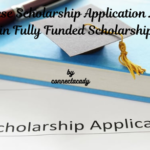
Have you ever thought that only top students with perfect grades can win scholarships? There are strategies to secure scholarships with average grades. It’s entirely possible to secure a fully funded scholarship with the right strategy. While a high GPA can be an advantage, it’s not the only factor that determines scholarship success.
The key is knowing how to position yourself as a strong candidate. In this guide, we’ll explore 8 strong strategies to secure scholarships with average grades. Keep reading, and you’ll discover actionable steps to boost your scholarship success.
Understanding the scholarship ecosystem
Not all scholarships prioritize GPA as the main selection criterion. This is because scholarships come in several forms and focus.
Different Types of Scholarships Available

Scholarships are awarded based on various factors, not just academic excellence. Some common types include:
- Merit-based scholarships: Focus on grades but may also consider extracurricular achievements.
- Need-based scholarships: Designed for students facing financial hardship.
- Athletic scholarships: Awarded to students excelling in sports.
- Creative and talent-based scholarships: For artists, musicians, and writers.
- Community service scholarships: Given to students with a strong record of volunteering.
Strategies to Secure Scholarships with Average grades
There are strategic ways to increase your chances of getting a scholarship even with average grades. These strategies include:
-
Highlight your non-scholarly achievements:
Often scholarship committees look out for well-rounded individuals. This means that they are also looking outside the academic qualities of scholarship applicants, which implies that you have to highlight your strengths beyond your academic qualities. Focus on attributes or achievements that can distinguish you if your GPA is not high. This includes:
- Work experiences related to your field
- Volunteer work (community service or fundraising events)
- Achievements in arts, entrepreneurship, and even sports
- Leadership roles in student and community organizations (treasurer, presidency or community leader)
- Professional associations.
Also remember to back up these achievements with evidence:
- certificates, media features as proof of your involvement in the activities
- recommendation letters too.
-
Target non-GPA-based scholarships
Concentrate on non-GPA requirement scholarships and easy scholarships to apply for. Most funding organizations focus on:
- Personal achievements: competitions, entrepreneurial ventures, personal projects
- Community service: volunteer work and community development activities
- Research contributions: conferences, publications, projects, supervised work
- Extracurricular involvement: leadership roles, sports, charity, music
- Demographic-based scholarships: underdeveloped regions, underrepresented groups
To find these scholarships:
- Search and follow research foundations that support early-career scientists
- Use online platforms such as grants.gov, scholarships.com
-
Write a persuasive Personal Statement

In scholarship applications, a captivating personal statement can make up for a lower GPA. While writing your essay:
- keep your writing engaging, clear, and concise
- Highlight leadership roles and problem-solving skills.
- Showcase your strengths, experiences, and future goals.
- Explain any challenges that affected your academic performance.
- tell a life story that highlights your ambition or passion.
- Show a strong commitment to your field of study
This format should guide you structure your statement:
- Introduction: start with a persuasive story
- Body: freely discuss your experiences, obstacle and achievements
- Conclusion: emphasize on why you deserve the scholarship and how it will impact on your future
-
Obtain strong recommendation letters
Excellent recommendation letters from respected individuals can override a lower GPA. Ensure you choose people who can convincingly vouch for your potential, character, and skills in your absence. Seek to get recommendation letters from:
- Community leaders who witnessed your community service
- supervisors, mentors, or employers
- professors that know your work principles.
To get a recommendation letter:
- choose referees that can strengthen your strengths beyond academic performances
- ensure you provide a list of your goals and achievements to the referee to guide him or her in writing
- request the recommendation letter early to avoid your referee rushing it.
5. Highlight your work experience and research
In post-graduate and research-based scholarships, work and research experience often outweigh GPA. Therefore, in your application, emphasize:
- Teaching assistant roles
- Research publications and projects
- Industry-related experiences
- Conference presentations
Furthermore, to make your work visible, publish in open-access journals and create a LinkedIn profile that features your research and work experiences.
-
Explore and apply for many scholarships
Explore and apply for more scholarship programs. Do not limit yourself to one or two scholarships. Increase your chances of getting funding by applying for many scholarships. Also, look out for national or local scholarships.
Since funds are allocated for scholarships on a rolling basis, applying early becomes very important. You can create a scholarship application calendar to guide you.
To keep you organized:
- Set reminders or create a scholarship calendar to track scholarships
- Use a spreadsheet to track status, requirements, and eligibility
- Prepare application materials ahead of time.
-
Capitalize on mentorship and networking

Keep in touch with your school’s alumni body, professors, and professionals in your field. They often times know the composition of the scholarship committees and what they are looking for. By networking you can get insider tips and references.
Areas to network:
- Professional conferences and seminars
- University alumni associations
-
Seek alternative sources of funding
You can also explore non-scholarship sources for funds. Some of them include:
- Crowdfunding platforms (GoFundMe)
- Research grants
- Company sponsorships
Scholarships That Don’t Require High Grades
1. No-Essay & Easy Application Scholarships
These scholarships don’t have GPA requirements and are open to all students:
- Niche $2,000 “No Essay” Scholarship – Open to all students and easy to apply.
- ScholarshipPoints $10,000 Scholarship – Earn points by completing tasks to enter drawings.
- Bold.org No-Essay Scholarships – Various awards available without GPA requirements.
- CollegeXpress Monthly Scholarship – A simple sign-up-based scholarship opportunity.
2. Talent & Creativity-Based Scholarships
These scholarships reward artistic, athletic, or leadership skills:
- Live Más Scholarship (Taco Bell Foundation) – For students with creative passions.
- Coca-Cola Scholars Program – Recognizes leadership and service, not just GPA.
- Create-A-Greeting-Card Scholarship – For students with artistic talent.
- Dr. Pepper Tuition Giveaway – For students with unique goals and ambitions.
3. Community Service & Leadership Scholarships
These scholarships recognize students committed to making a difference:
- Equitable Excellence Scholarship(formerly AXA Achievement Scholarship)– Rewards community leaders.
- Prudential Spirit of Community Awards – Recognizes youth volunteering efforts.
4. STEM & Career-Based Scholarships
Many STEM scholarships don’t require a high GPA:
- Dell Scholars Program – Focuses on grit and perseverance, not grades.
- Unigo $10K Scholarship – A simple essay-based scholarship.
Conclusion
These strategies to secure scholarships is all encompassing but needed you to put in the required efforts. By focusing on your achievements and strengths, crafting persuasive applications, and demonstrating sound leadership qualities you can tremendously increase your chances of getting a scholarship.
Start taking action now and unlock great opportunities awaiting you. Look out for easy scholarships to apply for, scholarships for low GPAs and no GPA requirement scholarships.










